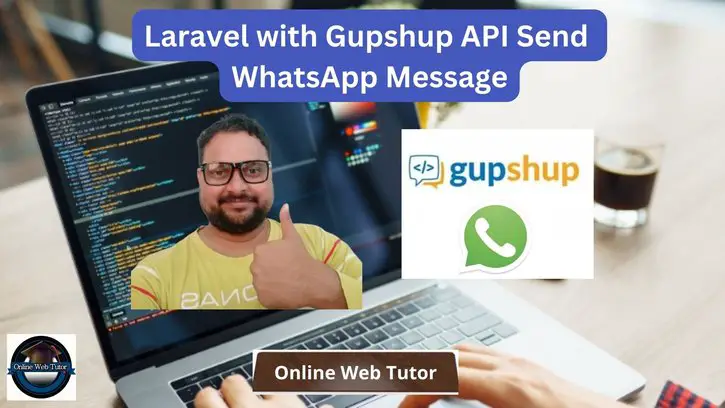Incorporating WhatsApp messaging capabilities into web applications has become increasingly valuable for interactive user communication. Gupshup, a prominent messaging API provider, offers seamless integration with WhatsApp, enabling developers to send messages programmatically.
Leveraging Gupshup API within Laravel, a robust PHP framework, facilitates the delivery of WhatsApp messages with ease. In this tutorial, we’ll see the process of integrating the Gupshup API to send WhatsApp messages in Laravel.
Read More: How To Install and Work with Bootstrap 5 in Laravel 10
Let’s get started.
Laravel Installation
We will create laravel project using composer. So, please make sure your system should have composer installed. If not, may be this article will help you to Install composer in system.
Here is the command to create a laravel project-
composer create-project --prefer-dist laravel/laravel blog
To start the development server of Laravel –
php artisan serve
URL: http://127.0.0.1:8000
Assuming laravel already installed inside your system.
Gupshup API & Template Settings
Here, you will see settings of Template setup inside your gupshup dashboard.
Gupshup business template is the way to bind your messages in placeholders to send your customers.
>> Login to Gupshup Account
Login to your account by putting email address and password,
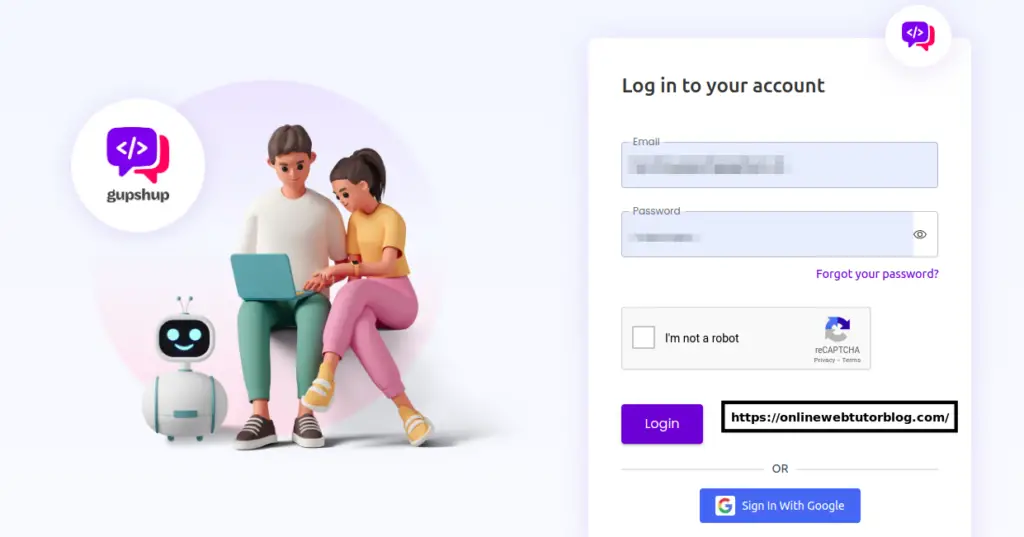
After login, Click on Channels >> WhatsApp
>> Create New Template
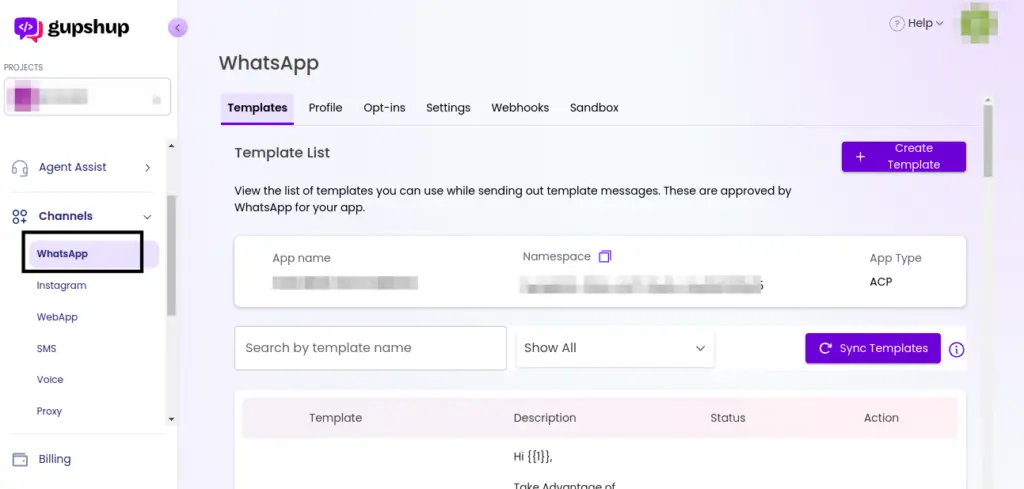
Next, click on Create Template button to create your own layout for message with placeholders.
Read More: How To Install and Use jQuery in Laravel Example
Template Example,
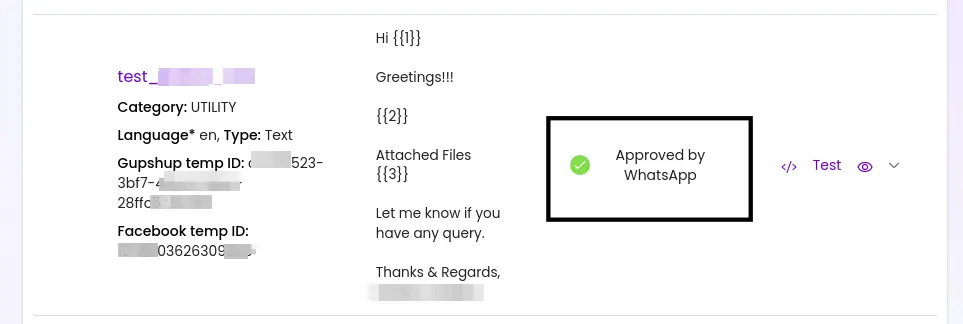
Once you create your template then you can use it but the template should be Approved by WhatsApp. After template submission generally it takes 24 hours to review and approve by WhatsApp.
>> Required API Parameters
To send messages by Gupshup, you need following parameters,
- GupShup API URL
- API Key
- Template ID
- App Name
- Source Number
Let’s setup these details into application.
Setup GupShup Parameters to Application
Open .env file and setup your environment variables like this,
WHATSAPP_GUPSHUP_API_URL="https://api.gupshup.io/wa/api/v1/template/msg"
WHATSAPP_GUPSHUP_API_KEY="xxx-yyy-zzz"
WHATSAPP_GUPSHUP_TEMPLATE_ID="aaaa-bbbb-cccc-dddd-eeee"
GUPSHUP_APP_NAME="PQRSABCD1234..."
WHATSAPP_GUPSHUP_SOURCE_NUMBER="91xxxyyyzzzz"Now, you can use this variable globally in your application.
Message Controller Setup and Settings
Open project terminal and run this command,
php artisan make:controller MessageControllerIt will create MessageController.php inside /app/Controllers folder.
Open file and write this complete code into it,
<?php
namespace App\Http\Controllers;
use Illuminate\Http\Request;
class MessageController extends Controller
{
public function index()
{
// Setup parameters
$mobile = "918888888888"; // Country code 91 and then number
$data = [
"name" => "Sanjay",
"message" => "Sample message to test with this template",
"files" => [
"http://example.com/.....",
//...
]
];
if($this->send_whatsapp_message($mobile, $data)){
// Message sent
}else{
// Failed to sent message
}
}
// Send message
public function send_whatsapp_message($mobile_number, $data = array()){
$url = WHATSAPP_GUPSHUP_API_URL;
// Attach files in new lines
if(isset($data["files"]) && count($data["files"]) > 0){
$data["files"] = implode(" ", $data["files"]);
}else{
$data["files"] = "--";
}
$data = [
'channel' => 'whatsapp',
'source' => WHATSAPP_GUPSHUP_SOURCE_NUMBER,
'destination' => $mobile_number,
'src.name' => GUPSHUP_APP_NAME,
'template' => json_encode([
'id' => WHATSAPP_GUPSHUP_TEMPLATE_ID,
'params' => [
$data["name"],
$data["message"],
$data["files"],
]
])
];
$headers = [
'apikey: '. WHATSAPP_GUPSHUP_API_KEY,
'Content-Type: application/x-www-form-urlencoded',
'Cache-Control: no-cache'
];
$ch = curl_init($url);
curl_setopt($ch, CURLOPT_POST, 1);
curl_setopt($ch, CURLOPT_POSTFIELDS, http_build_query($data));
curl_setopt($ch, CURLOPT_HTTPHEADER, $headers);
curl_setopt($ch, CURLOPT_RETURNTRANSFER, true);
$response = curl_exec($ch);
curl_close($ch);
// {"status":"submitted","messageId":"fed16964-104b-4b54-a9a1-ba37fd7e8a76"}
$response = json_decode($response, true);
if($response['status'] == "submitted"){
return true;
}else{
return false;
}
}
}
Read More: Laravel CRUD Using WordPress REST API with JWT Tutorial
Next,
When you run this you will get whatsapp message to your destination number.
Example Output,
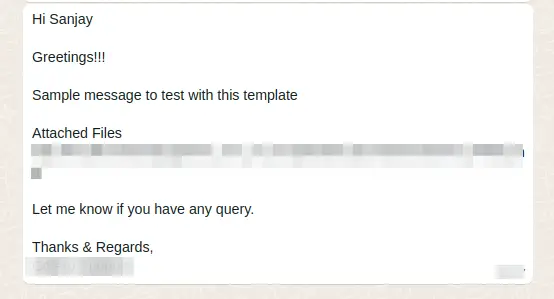
That’s it.
We hope this article helped you to learn about Laravel with Gupshup API Send WhatsApp Message Tutorial in a very detailed way.
Online Web Tutor invites you to try Skillshike! Learn CakePHP, Laravel, CodeIgniter, Node Js, MySQL, Authentication, RESTful Web Services, etc into a depth level. Master the Coding Skills to Become an Expert in PHP Web Development. So, Search your favourite course and enroll now.
If you liked this article, then please subscribe to our YouTube Channel for PHP & it’s framework, WordPress, Node Js video tutorials. You can also find us on Twitter and Facebook.
